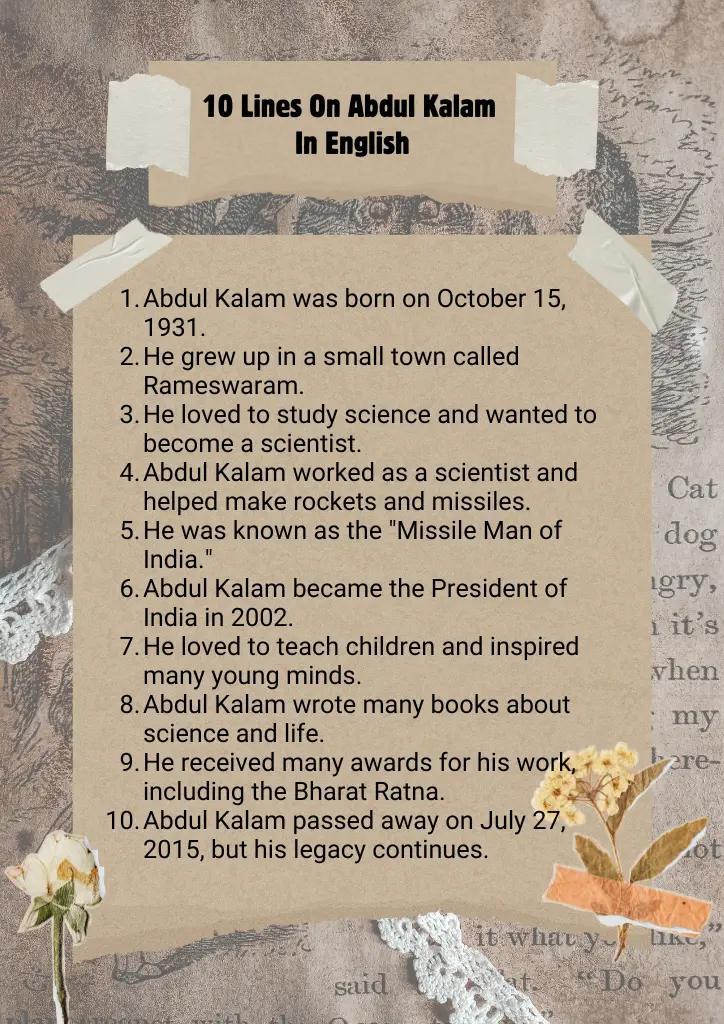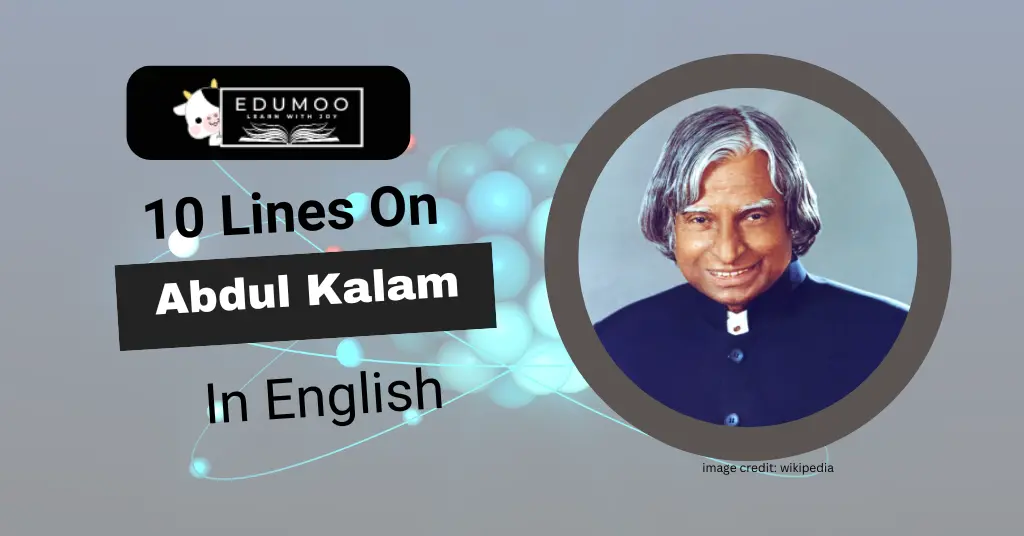Abdul Kalam, also known as the “Missile Man of India,” is a name that brings pride to every Indian. He was not only a brilliant scientist but also an inspiring leader. Born in a small town, Abdul Kalam worked hard to achieve his dreams and became the President of India. His life story is full of lessons and motivation for young students. Let’s learn more about this amazing personality through these 10 lines on Abdul Kalam that will help you understand his contributions and achievements.
10 Lines On In Abdul Kalam English
- Abdul Kalam was born on October 15, 1931.
- He grew up in a small town called Rameswaram.
- He loved to study science and wanted to become a scientist.
- Abdul Kalam worked as a scientist and helped make rockets and missiles.
- He was known as the “Missile Man of India.”
- Abdul Kalam became the President of India in 2002.
- He loved to teach children and inspired many young minds.
- Abdul Kalam wrote many books about science and life.
- He received many awards for his work, including the Bharat Ratna.
- Abdul Kalam passed away on July 27, 2015, but his legacy continues.

Essay On Abdul Kalam In English In 250 Words
Abdul Kalam, known as the “Missile Man of India,” was born on October 15, 1931, in a small town called Rameswaram. From a young age, he was very curious and loved to learn about science. His family wasn’t rich, but they valued education, and Abdul Kalam worked hard in school. After completing his studies, he became a scientist and worked for the Indian Space Research Organisation (ISRO) and the Defence Research and Development Organisation (DRDO).
Abdul Kalam played a key role in developing India’s missile and space programs. His work earned him the nickname “Missile Man.” He was a part of many important projects, including the development of the Agni and Prithvi missiles. His contributions to science and technology were widely recognized, and he received many awards, including India’s highest civilian award, the Bharat Ratna.
In 2002, Abdul Kalam became the 11th President of India. He was loved by people of all ages for his humility and dedication. Even as President, he continued to teach and inspire students. He believed that the future of India depended on the education and development of its young people. He wrote several books, sharing his knowledge and ideas, including “Wings of Fire,” his autobiography.
Abdul Kalam passed away on July 27, 2015, while giving a lecture to students. His life is a testament to the power of dreams and hard work. He showed that with determination and a positive attitude, one can overcome any challenge. Abdul Kalam remains a beloved figure in India, remembered not just for his scientific achievements but also for his kindness and commitment to inspiring future generations.
| Also Read: 10 lines on Jagdish Chandra Bose In English |
Essay On Abdul Kalam In English In 750 Words
Abdul Kalam, also known as Dr. A.P.J. Abdul Kalam, is one of the most respected and admired figures in India. He was born on October 15, 1931, in a small town called Rameswaram in Tamil Nadu. His full name was Avul Pakir Jainulabdeen Abdul Kalam. From a young age, Abdul Kalam was very curious and loved to learn. His father was a boat owner, and his mother was a housewife. Despite not being wealthy, his family valued education greatly.
Abdul Kalam’s early life was not easy. He had to work hard to support his family and also to continue his education. He used to distribute newspapers to earn money. However, he never let these difficulties stop him from studying. He was very good at mathematics and science. After finishing school, he went to Saint Joseph’s College in Tiruchirappalli, where he studied physics. Later, he moved to Madras (now Chennai) to study aerospace engineering at the Madras Institute of Technology.
After completing his studies, Abdul Kalam joined the Defence Research and Development Organisation (DRDO) as a scientist. He worked on a hovercraft project there, but his real interest was in space and rockets. In 1969, he moved to the Indian Space Research Organisation (ISRO), where he played a key role in developing India’s first satellite launch vehicle, SLV-3, which successfully deployed the Rohini satellite in 1980.
Abdul Kalam’s work in the field of space and missile technology earned him the nickname “Missile Man of India.” He was the project director for many important projects, including the development of the Agni and Prithvi missiles. His dedication and hard work contributed significantly to making India self-reliant in defense technologies.
In 2002, Abdul Kalam was elected as the 11th President of India. He was the first scientist and the first bachelor to occupy the Rashtrapati Bhavan, the official residence of the President of India. As President, he was very popular among the people, especially the youth. He traveled extensively across the country and met students from different schools and colleges. He always encouraged young people to dream big and work hard to achieve their goals.
While he was President, he kept motivating the country with his dream of a better India. He suggested a plan named “Vision 2020
After completing his term as President in 2007, Abdul Kalam did not retire from public life. Instead, he returned to what he loved most – teaching and inspiring young minds. He became a visiting professor at various universities and institutes, including the Indian Institute of Management (IIM) and the Indian Institute of Science (IISc). He enjoyed interacting with students and sharing his knowledge and experiences with them.
Abdul Kalam was also a prolific writer. He wrote many books on science, technology, and his vision for India. Some of his famous books include “Wings of Fire,” which is his autobiography, “Ignited Minds,” and “India 2020.” His writings continue to inspire people to work hard and contribute to the development of the country.
Throughout his life, Abdul Kalam received numerous awards and honors for his contributions to science and the nation. He was awarded the Padma Bhushan in 1981 and the Padma Vibhushan in 1990, two of India’s highest civilian honors. In 1997, he received the Bharat Ratna, India’s highest civilian award. He was also honored with several international awards and degrees from various universities around the world.
Abdul Kalam died on July 27, 2015, while giving a speech at the Indian Institute of Management Shillong. His unexpected death was a big loss for the country. However, his legacy continues to live on through his contributions to science, his vision for India, and his inspirational words.
Abdul Kalam’s life teaches us the importance of hard work, dedication, and perseverance. He showed that with determination and a positive attitude, one can overcome any challenge. He remains a role model for millions of people, especially young students who dream of making a difference in the world.
Abdul Kalam once said, “Dream, dream, dream. “Dreams change into ideas, and ideas lead to actions.” His life shows that this is true. He dreamed big, worked hard to achieve his dreams, and inspired others to do the same. Abdul Kalam’s story is a source of inspiration and motivation for everyone who wants to achieve greatness and contribute to the betterment of society.
Conclusion
Today, we have learnt 10 lines on Abdul Kalam. His life teaches us the importance of hard work, dedication, and dreaming big. He showed that with determination, anyone can achieve their goals, no matter where they come from. His love for education and his efforts to inspire young minds make him a true role model. By learning about Abdul Kalam, we can find the courage to pursue our own dreams and make a positive difference in the world.

